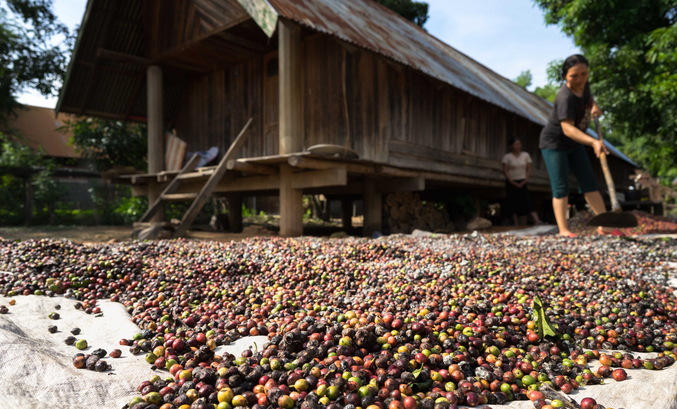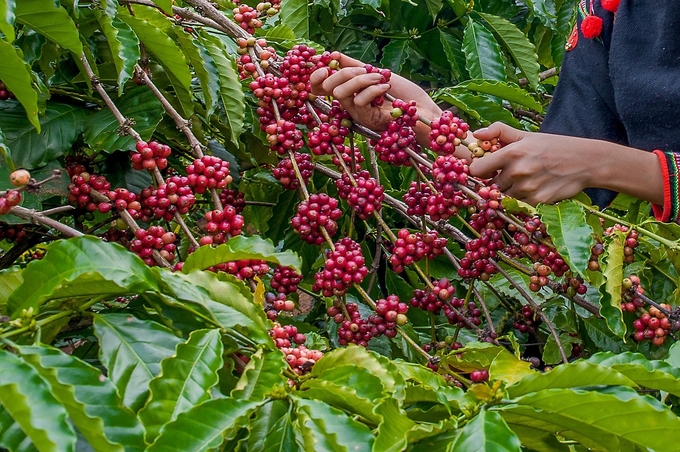May 30, 2025 | 10:06 GMT +7
May 30, 2025 | 10:06 GMT +7
Hotline: 0913.378.918
May 30, 2025 | 10:06 GMT +7
Hotline: 0913.378.918

Coffee is a key export item of the Central Highlands and Vietnam.
According to the European Commission's Directorate-General for the Environment, one of the goals of the European Union's No Deforestation Regulation (EUDR) is to increase the demand for and trade in legal and "forest non-destructive" items and products.
The EU believes it will create new business opportunities for sustainable farmers globally by encouraging partner countries to strengthen forest protection through cooperation programs and market incentives in this Regulation.
Seven product groups are selected for deployment, including palm oil, soybeans, timber, cattle, cocoa, coffee, rubber, and some products derived from that place. The list of related products will continue to be updated by the EU every two years.
The EUDR requires importers and supply chain partners to demonstrate that their products are unrelated to deforestation or forest degradation after December 31, 2020.
Two main contents are proposed by EUDR, namely “mandatory due diligence” and “matching system”.
In particular, mandatory due diligence is required for all businesses bringing the relevant goods to the EU market or exporting from the EU. In particular, enterprises in the supply chain must establish and operate an appraisal system to ensure that only products that do not cause or are related to deforestation and are legal are allowed to be imported into or exported from the EU.
Based on the definitions of forest loss and degradation recognized by international organizations such as FAO, IPCC, etc., this system will be reviewed and updated annually and archived for 5 years. By December 30, 2024, the European Commission will develop and operate a tracking management information system, including updating appraisal disclosures.
The EUDR also emphasizes that essential obligations apply to non-SME operators, businesses, and traders. At the same time, strict traceability of goods to each production plot, based on GPS coordinates.

Pham Tuan Anh considers EUDR as an opportunity for Dak Nong's coffee industry to restructure.
The remaining important part of the EUDR is the matching system. This is like a classification table, ranking risks for countries or regions according to the level of risk of deforestation.
The appraisal process will be more straightforward for operators and manufacturing enterprises in areas with low risk of deforestation. According to the European Environment Agency, this group only needs to collect information but not assess and fulfill its risk reduction obligations.
Regarding the minimum level of testing, the EUDR offers 9%, 3%, and 1% milestones. Europe can check the number of businesses that bring goods, products, or products from producing countries into the EU or export from the EU, depending on whether the risk is high, standard, or low.
Among the 7 groups of products subject to EUDR regulation, the coffee industry is the most concerned by Vietnamese businesses. Currently, Vietnam is the second largest coffee exporter in the world, and 60% of export volume is to the EU.
Coffee trees are significant in Dak Nong province, which accounts for about 20% of the country's coffee production, just behind Dak Lak and Lam Dong. The whole province has over 130 different types of plants and animals. Among the 7 groups of products subject to EUDR regulation, the coffee industry is the most concerned by Vietnamese businesses. Currently, Vietnam is the second largest coffee exporter in the world, and 60% of export volume is to the EU.
Coffee trees are essential in Dak Nong province, which accounts for about 20% of the country's coffee production, just behind Dak Lak and Lam Dong. The whole province has over 130 different types of plants and animals. In which, four key products at the provincial level have been identified: 140,000 ha of coffee, 35,000 ha of pepper, 24,000 ha of rubber, and 17,000 ha of cashew.
Not only occupying more than 1/5 of the natural land area, more than half of the area of perennial industrial crops, coffee is also the livelihood of about 70,000 farmer households in Dak Nong province.
The difficulty of Dak Nong coffee, according to Mr. Pham Tuan Anh, director of the Department of Agriculture and Rural Development, is that up to now, the province has no database on orchards, traceability, and isolation of planting areas. The percentage of planted areas certified to standards and linkages is still low. The scale of agricultural production in Dak Nong is still tiny, so it is more susceptible to EUDR impacts. In which, four critical products at the provincial level have been identified: 140,000 ha of coffee, 35,000 ha of pepper, 24,000 ha of rubber, and 17,000 ha of cashew.
Not only occupying more than 1/5 of the natural land area, more than half of the area of perennial industrial crops, coffee is also the livelihood of about 70,000 farmer households in Dak Nong province.
The difficulty of Dak Nong coffee, according to Pham Tuan Anh, director of the Department of Agriculture and Rural Development, is that up to now, the province has no database on orchards, traceability, and isolation of planting areas. The percentage of planted areas certified to standards and linkages is still low. The scale of agricultural production in Dak Nong is still tiny, so it is more susceptible to EUDR impacts.

The coffee area in Dak Nong is about 140,000 ha, which is the livelihood of about 70,000 farmer households.
Assessing the impact of EUDR on the coffee industry, Pham Tuan Anh said that, except for the requirements for export businesses, the EUDR has 4 main groups of requirements for localities and producers.
Firstly, data must be on Global Positioning Systems (GPS) and polygon for each plot coffee garden. Second, establish a data information system for the lot and coffee garden to serve as a basis for product traceability and supporting supply chain connection. Third, develop a plan to monitor, report, and respond to information on product traceability and forest protection related to coffee production and logging. Fourth, there is a mechanism for reporting news and feedback upon request from the importing country.
Implementation of EUDR is considered by the head of the Department of Agriculture and Rural Development as a new opportunity for Dak Nong's agriculture. It is an opportunity for Dak Nong to restructure agriculture in the direction of a commodity chain, a product value chain with legal traceability and environmental sustainability. It contributes to forest protection, not causing forest degradation and providing opportunities to raise the value of agricultural products of the province, increasing income for farmers, businesses, and cooperatives.
"Implementing the EUDR is difficult. But if not, the EUDR is even more difficult because we will slip ourselves out of the global agricultural supply chain. Therefore, all levels, sectors, businesses, and the people of Dak Nong province must learn and implement this regulation together," emphasized Pham Tuan Anh.
Minister of Agriculture and Rural Development Le Minh Hoan said that EUDR clearly shows the change in world consumption trends. Acknowledging some challenges, he sees this as an opportunity for the entire industry to restructure.
To implement effectively and sustainably, meeting EUDR's regulations, Minister Le Minh Hoan called for the unanimity and participation of businesses and industry associations to activate public cooperation - to become a bridge between state management agencies, farmers, and localities.
Translated by Tu Quyen

(VAN) The mutual export of agrifood products between the European Union (EU) and the United Kingdom (UK) must occur again without certification, border controls or other red tape. This was agreed at the UK-EU summit.
/2025/05/22/5121-2-173645_677.jpg)
(VAN) NBSAP Tracker identifies strengths and areas for improvement in the National Biodiversity Strategy, based on each region’s priorities and capacities.

(VAN) The draft amendment to the Circular on rice export trading stipulates a periodic reporting regime for rice exporting enterprises.

(VAN) Dong Thap farmers attained an average profit margin of 64% during the summer-autumn 2024 crop (first season), while An Giang and Kien Giang farmers followed with 56% and 54%, respectively.

(VAN) As a doctoral student doing research on renewable energy and electrification at Harvard University, the author shares his musings on electricity, nature, and countryside memories.

(VAN) The decree on Extended Producer Responsibility (EPR) ensures transparent management and disbursement of support funds, avoiding the creation of a “give-and-take” mechanism.

(VAN) Hue City rigorously enforces regulations regarding marine fishing and resource exploitation, with a particular emphasis on the monitoring of fishing vessels to prevent illegal, unreported, and unregulated (IUU) fishing.